In a world brimming with toys and gadgets, finding the perfect gift for a child can feel like navigating a maze. But fear not! Whether you’re a parent, grandparent, aunt, uncle, or friend, this guide will help you understand the importance of age-appropriate gifts and their impact on a child’s development.
Choosing the right gift for a child can be challenging, but understanding gift ideas by age can make the process both easier and more rewarding. In this comprehensive guide, we’ll explore how age-appropriate presents can positively impact a child’s development and bring joy to both the giver and receiver.
Why Are Gift Ideas by Age So Important?
Have you ever wondered why some gifts end up forgotten in a corner while others become a child’s favorite? The secret often lies in how well the gift matches the child’s developmental stage. Age-appropriate gifts aren’t just about avoiding choking hazards or complex instructions; they’re about providing tools that align with a child’s current abilities and interests, challenging them just enough to spark growth and engagement.
Child development experts generally agree that age-appropriate toys and gifts can enhance a child’s play experience. When children receive gifts that match their developmental stage, they’re more likely to engage with them in meaningful ways, potentially leading to longer periods of focused play and greater opportunities for learning and skill development.
The Science Behind Age-Appropriate Gifts
Before we dive into specific gift ideas, let’s take a moment to understand the science behind age-appropriate giving. Child development experts have long recognized that children go through distinct stages of growth, each characterized by specific cognitive, physical, and emotional milestones.
Key Developmental Domains:
- Cognitive Development: This includes problem-solving skills, memory, and language acquisition.
- Physical Development: Encompasses both fine and gross motor skills.
- Social and Emotional Development: Involves understanding emotions, developing empathy, and building relationships.
- Creative Development: Includes imagination, artistic expression, and innovative thinking.
Age-appropriate gifts support these developmental domains by providing children with tools and experiences that match their current abilities while gently pushing them towards new challenges. It’s like providing a ladder with rungs at just the right distance – not so far apart that climbing is impossible, but not so close together that there’s no sense of achievement.
The Role of Play in Learning
Play isn’t just fun – it’s a child’s most important job! Through play, children:
- Develop problem-solving skills
- Enhance their creativity
- Improve social skills
- Build emotional resilience
- Strengthen physical abilities
According to the American Academy of Pediatrics, play is so crucial for child development that it should be considered a basic right for all children. When we choose age-appropriate gifts, we’re not just giving a toy or an experience – we’re providing a valuable tool for learning and growth.
Gift Ideas by Age: A Developmental Perspective
Now, let’s explore gift ideas for each age group, keeping in mind the developmental milestones and interests typical of each stage. Remember, every child is unique and may develop at their own pace, so use these guidelines as a general framework rather than strict rules.
Newborns & Infants (0-1 year)
The first year of a baby’s life is a time of rapid growth and constant discovery. Infants learn through their senses, making multi-sensory toys with contrasting colors, varied textures, and gentle sounds ideal for promoting cognitive and physical development. As babies progress from reflexive movements to intentional actions, gifts that encourage reaching, grasping, and eventually crawling are beneficial. Remember, simplicity is key – the goal is to provide gentle stimulation that engages without overwhelming their developing senses.
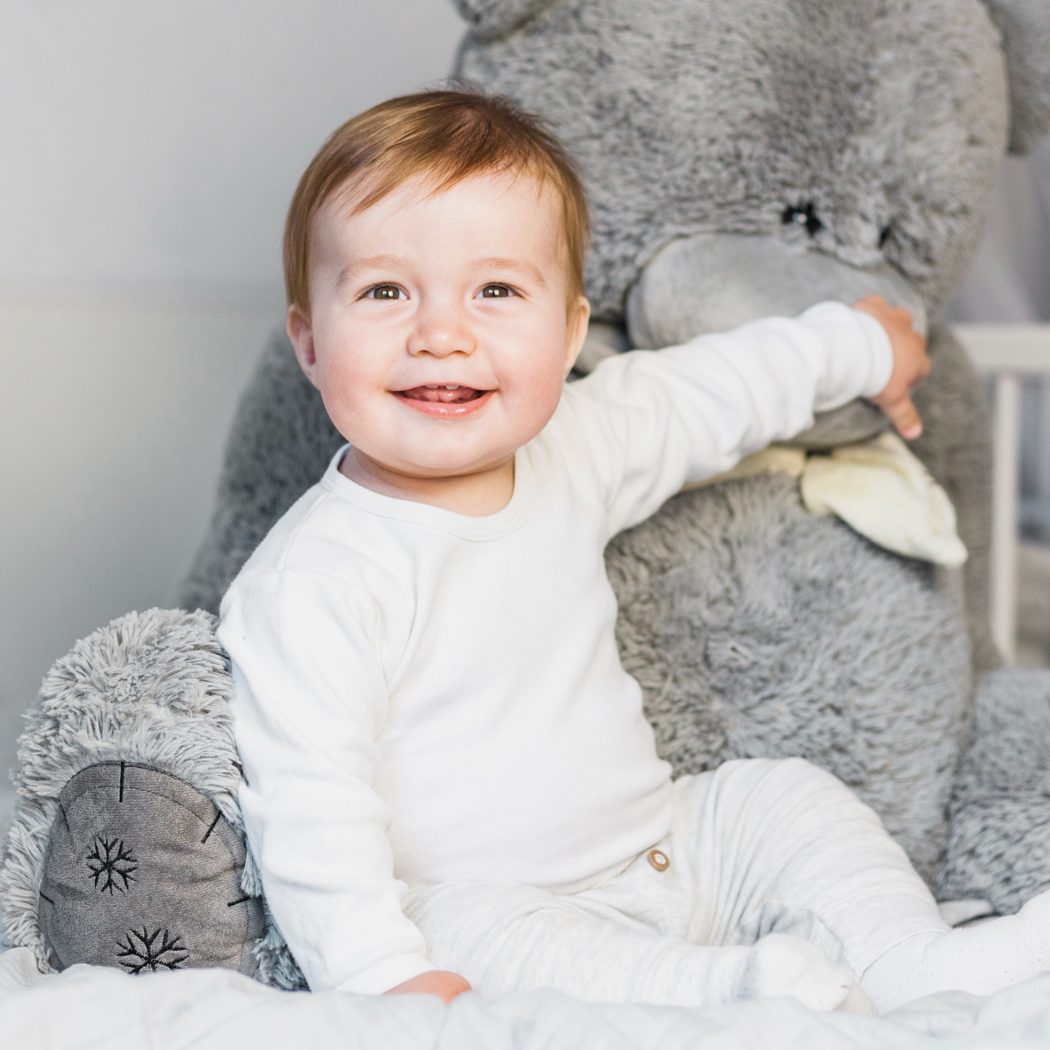
Developmental Milestones:
- Recognizing faces and voices
- Reaching for and grasping objects
- Developing object permanence
- Beginning to crawl and possibly walk
Gift Ideas:
- Soft, textured toys for sensory exploration
- Simple board books with high-contrast images
- Musical toys or instruments
- Stacking rings or cups
Safety Tip: Always check for small parts that could pose a choking hazard. Opt for toys specifically designed for infants.
Toddlers (1-3 years)
Toddlerhood is a time of burgeoning independence and curiosity. These little explorers are constantly on the move, refining both gross and fine motor skills. Language development explodes during this period, with toddlers rapidly expanding their vocabulary. Their imagination begins to blossom, leading to early forms of pretend play. Gifts that encourage physical activity, support language growth, and allow for creative exploration are ideal. Look for toys that can withstand enthusiastic play and offer multiple ways to engage as the child’s skills develop.
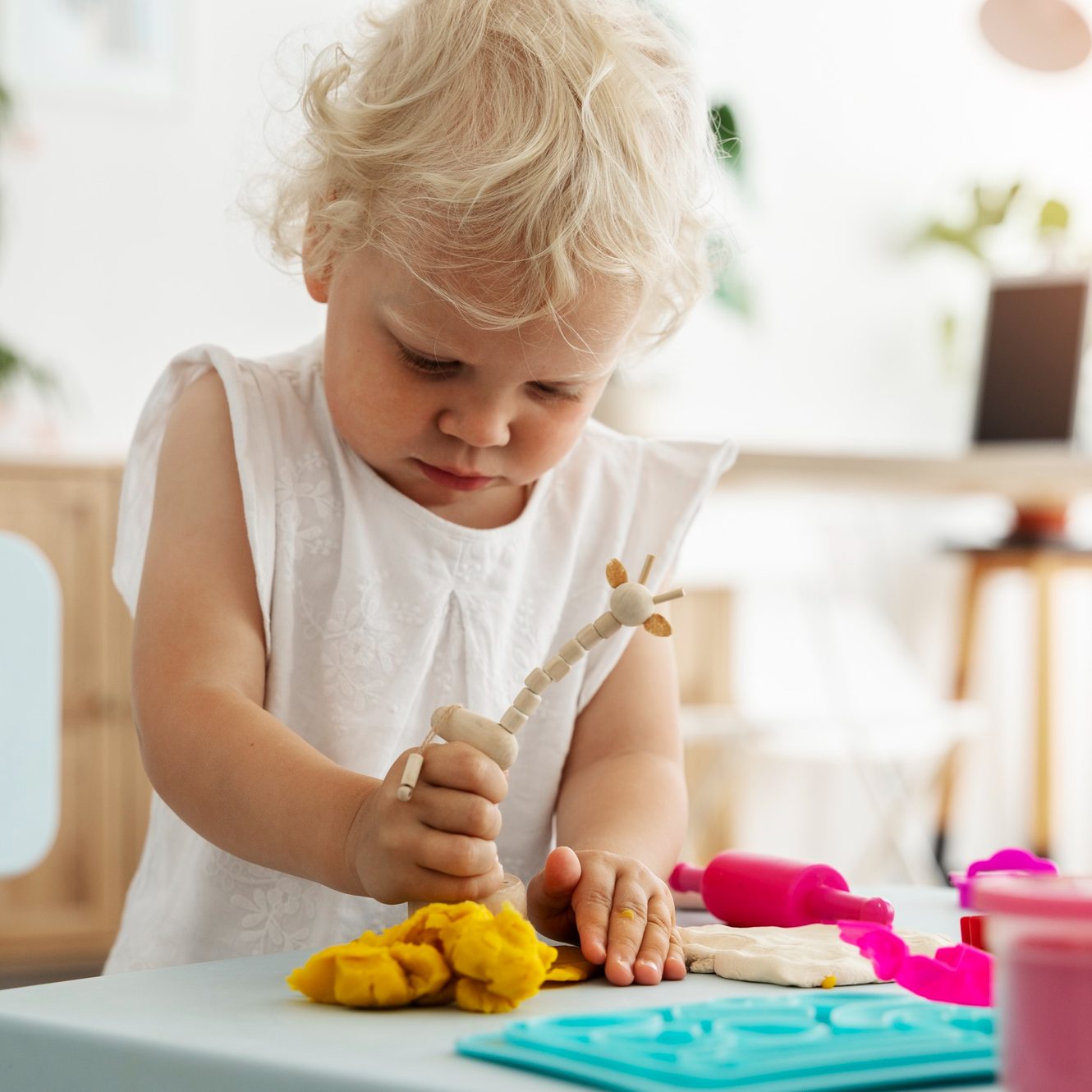
Developmental Milestones:
- Rapid language acquisition
- Improved fine and gross motor skills
- Beginning of imaginative play
- Increased independence and self-awareness
Gift Ideas:
- Push-and-pull toys to encourage walking
- Simple puzzles with large pieces
- Art supplies like chunky crayons and finger paints
- Dress-up clothes for imaginative play
Pro Tip: Look for toys that can grow with the child. For example, building blocks can be used for simple stacking by young toddlers and more complex constructions as they grow.
Preschoolers (3-5 years)
Preschool years are marked by significant cognitive leaps and social growth. Children at this age are developing basic understanding of numbers, letters, and colors, while their imagination reaches new heights. They’re moving from parallel play to cooperative play, learning to share and work together. Language skills continue to flourish, with a rapidly expanding vocabulary and more complex sentence structures. Gifts that support emerging academic skills, encourage creative expression, and facilitate social interaction are particularly beneficial for this age group.
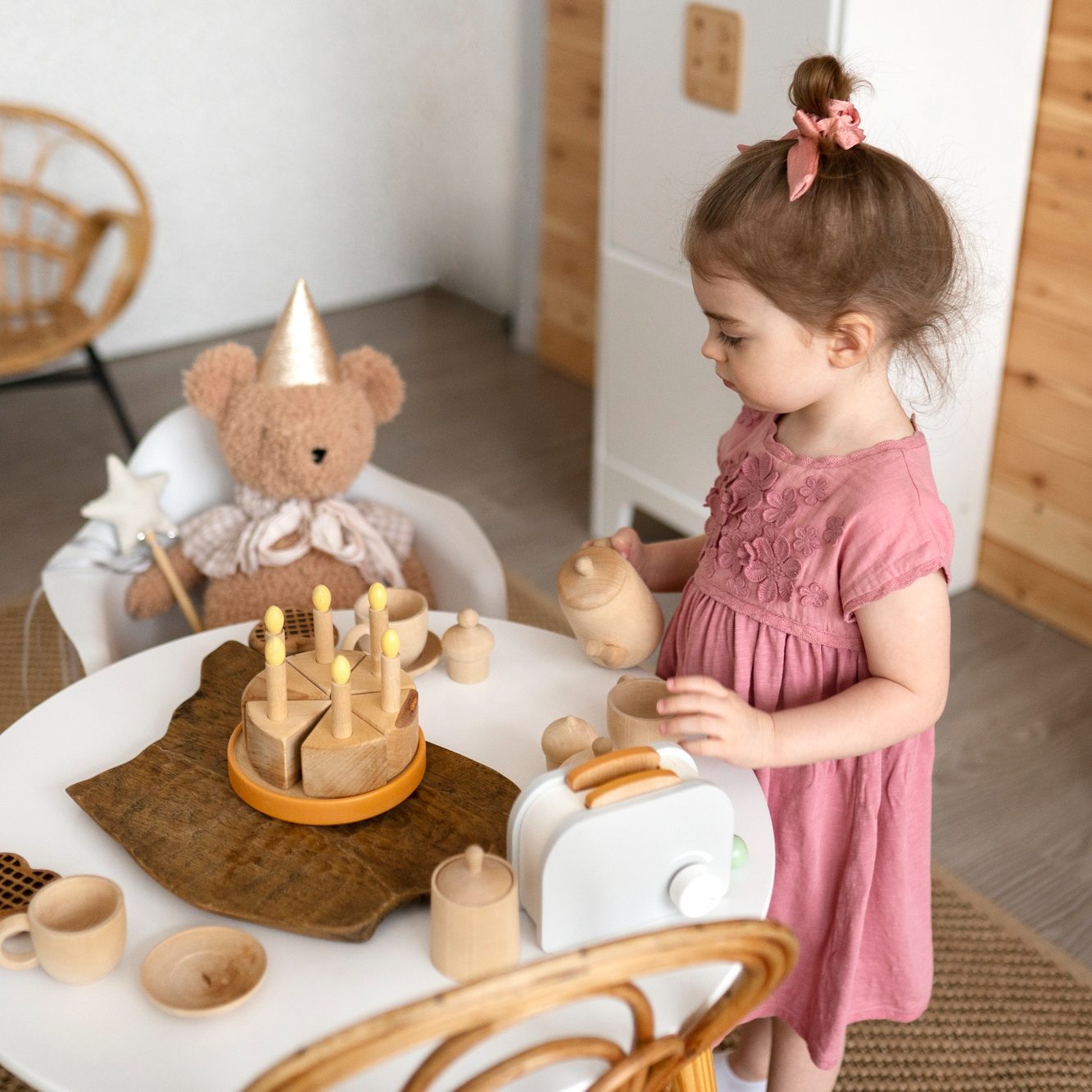
Developmental Milestones:
- Enhanced social skills and cooperative play
- Improved fine motor skills
- Emerging literacy and numeracy
- More complex imaginative play
Gift Ideas:
- Construction toys like LEGO DUPLO
- Art sets with safety scissors, glue sticks, and coloring supplies
- Pretend play sets (kitchen, doctor, etc.)
- Simple board games to encourage turn-taking
Young School-Age Children (6-9 Years)
The early school years bring significant cognitive and social developments. Children in this age group are developing more logical thinking and better memory strategies, allowing them to tackle more complex tasks. Their attention spans are increasing, and many discover passionate interests in specific subjects. Socially, peer relationships become more important, and they’re learning about teamwork and conflict resolution. Gifts that support their growing independence, nurture specific interests, and provide opportunities for skill mastery are particularly valuable for this age group.
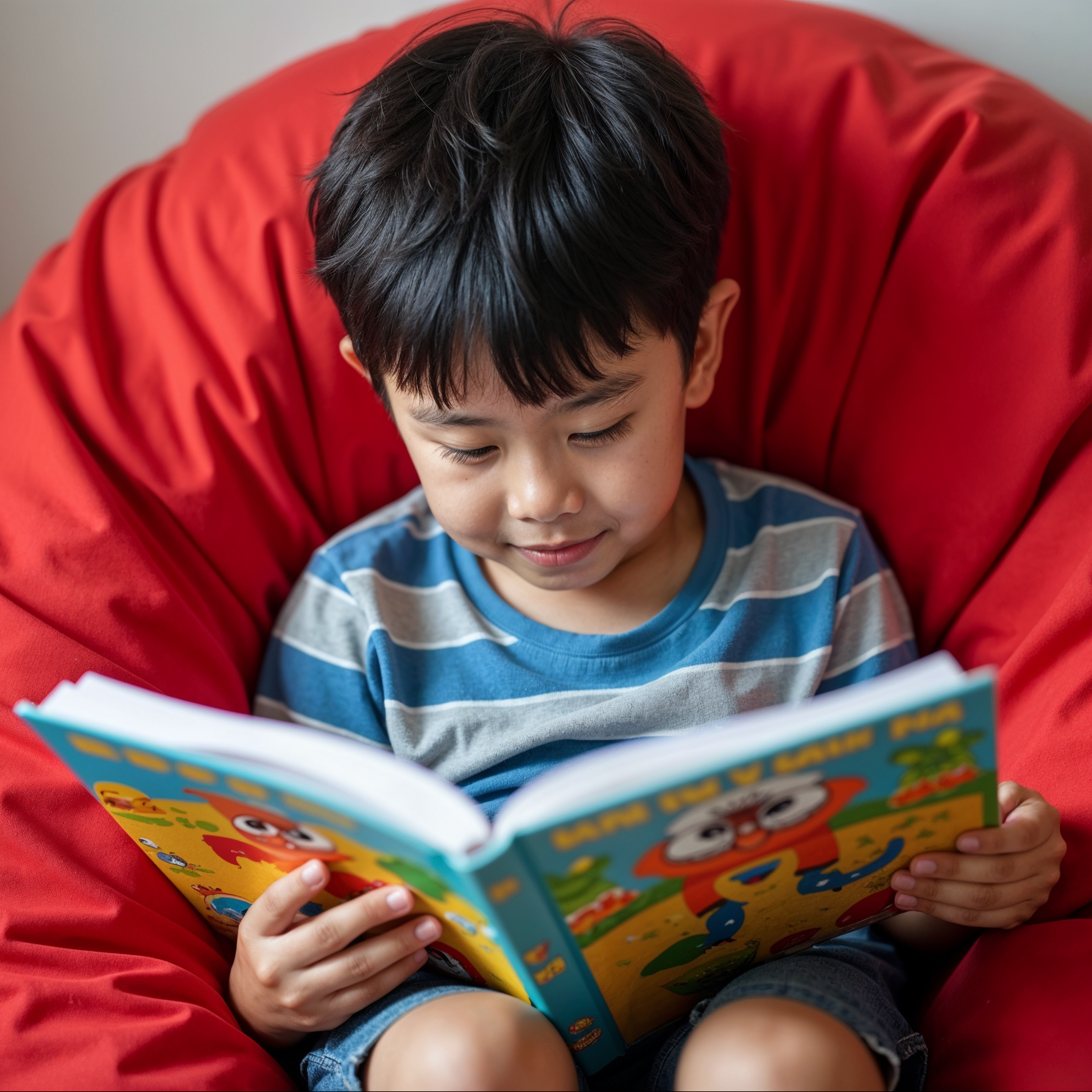
Developmental Milestones:
- Improved reading and writing skills
- Enhanced logical thinking
- Greater physical coordination
- Developing sense of humor
Gift Ideas:
- Science kits and experiments
- Sports equipment
- Craft kits for jewelry making, knitting, or model building
- Chapter books on topics of interest
Engagement Idea: Consider gifts that allow for family participation, like board games or outdoor activities. This can support social development and strengthen family bonds.
Tweens (9-12 Years)
The tween years bridge childhood and adolescence, bringing significant physical, cognitive, and social changes. Many tweens are entering or approaching puberty, often feeling self-conscious about these changes. Cognitively, they’re developing more advanced thinking skills, including abstract reasoning. Socially, peer relationships become increasingly important, and tweens start to assert their independence from family. They often become passionate about specific hobbies or interests. Gifts that respect their growing maturity, support their interests, help them develop new skills, and facilitate social connections are particularly appreciated by this age group.

Developmental Milestones:
- Increased abstract thinking
- Greater interest in socializing with peers
- Developing sense of identity
- More advanced physical skills
Gift Ideas:
- Electronics like tablets or e-readers
- More complex craft or building sets
- Musical instruments
- Gift cards to allow for independent choices
Gift-Giving Insight: When choosing gifts for tweens, it’s helpful to remember that this age group often straddles the line between childhood toys and more mature interests. Many tweens appreciate gifts that make them feel more grown-up, such as electronics, sports equipment, or items related to their developing hobbies. At the same time, they might still enjoy creative or imaginative gifts that allow for self-expression. Consider the individual tween’s interests and maturity level when selecting a gift.
Teenagers (13-18 Years)
The teenage years are a time of significant physical, cognitive, and emotional growth as adolescents transition towards adulthood. Teens are capable of complex, abstract thinking and are developing their own identities and values. Socially, peer relationships are paramount, and many teens become passionate about causes or interests. They’re also preparing for future roles, considering career paths and further education. Emotionally, teens experience intense feelings while learning to regulate them. Gifts that respect their growing independence, align with their interests, support their goals, and acknowledge their transition toward adulthood are particularly well-received by this age group.

Developmental Milestones:
- Advanced abstract thinking
- Increased independence
- Career and identity exploration
- Complex emotional and social experiences
Gift Ideas:
- Tech gadgets like smartphones or laptops
- Experience gifts like concert tickets or adventure activities
- Books or subscriptions related to specific interests
- Room décor items for personal expression
Digital Age Consideration: While technology can be a great gift for teens, it’s important to balance screen time with other activities. Consider pairing a tech gift with an outdoor or creative activity.
The Long-Term Impact of Age-Appropriate Gifts
Choosing the right gift isn’t just about the immediate joy it brings – it can have lasting effects on a child’s development. Here’s how:
- Building a Foundation for Lifelong Learning: Age-appropriate educational toys can foster a love of learning that lasts well beyond childhood.
- Fostering Creativity and Problem-Solving: Open-ended toys and activities encourage children to think outside the box and develop creative problem-solving skills.
- Supporting Emotional Intelligence: Gifts that encourage role-play or social interaction can help children develop empathy and emotional understanding.
- Boosting Confidence: When children successfully engage with age-appropriate challenges, it builds their confidence and self-esteem.
- Strengthening Relationships: Thoughtful, age-appropriate gifts show children that you understand and value their interests, strengthening your bond.
Common Pitfalls in Age-Based Gift-Giving
Even with the best intentions, it’s easy to fall into some common gift-giving traps. Here are a few to watch out for:
Choosing gifts that are too advanced
Selecting gifts that are too simple or “babyish”
Focusing too much on trends rather than developmental benefits
Overlooking the child’s individual interests
Giving gifts that require too much parental involvement
Tips for Selecting Age-Appropriate Gifts
To help you navigate the world of children’s gifts, here are some handy tips:
- Consider the Child’s Interests: While age is important, individual preferences matter too. A child interested in space might appreciate a telescope at a younger age than typical.
- Read Labels and Age Recommendations: Manufacturers provide age guidelines for safety and developmental appropriateness.
- Balance Types of Gifts: Aim for a mix of educational, creative, and active gifts to support all areas of development.
- Think Long-Term: Consider gifts that can “grow” with the child or have lasting value.
- Ask Parents for Input: When in doubt, parents can provide valuable insights into their child’s current interests and needs.
- Consider Durability: Especially for younger children, choose gifts that can withstand rough play.
- Look for Open-Ended Toys: These allow for multiple ways of playing, adapting to the child’s developing skills.
Conclusion
As we’ve explored throughout this guide, gift ideas by age are more than just a convenient way to shop – they’re a powerful tool for supporting a child’s development and bringing joy to their lives. By considering the developmental stage, interests, and needs of each age group, you can select presents that are not only fun but also beneficial.
Remember, the joy of giving isn’t just in the moment a child unwraps a present. It’s in the hours of engaged play, the skills developed, the imagination sparked, and the bond strengthened between giver and receiver. By choosing age-appropriate gifts, you’re not just giving a present – you’re giving tools for growth, learning, and joy.
So the next time you’re faced with choosing a gift for a child, take a moment to consider their age, their interests, and their developmental stage. Your thoughtful choice could be the key to unlocking new skills, fostering creativity, or simply bringing a huge smile to a child’s face. And isn’t that what gift-giving is all about?
Happy gifting!


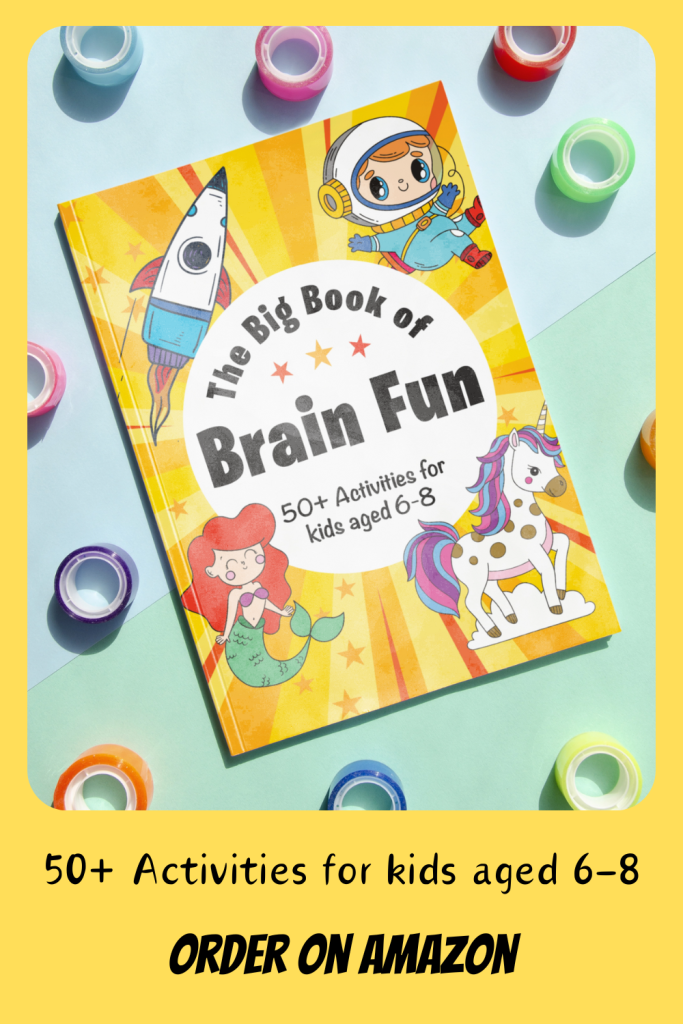




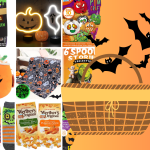
0 Comments